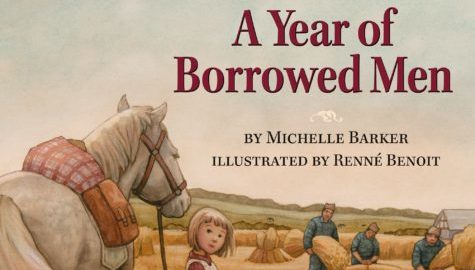
My recent article criticizing the historical omissions and misleading voice of the illustrated children’s book, A Year of Borrowed Men, generated a number of passionate responses. Pajama Press itself, an independent Canadian publisher which receives grants from noted government foundations supporting the arts, published a defense of their book on their website. Since they took my article and the depth of feeling it produced quite seriously, I would like to clarify my disappointment at the way this book presents a catastrophic era in history to the most receptive and vulnerable audience possible, young children.
First, I am certainly not suggesting that the book be banned, pulled from shelves, or removed from circulation. I am totally opposed to that approach when readers and educators fear the possible effects of a work of literature intended for children or young adults. I appreciate that Pajama Press welcomes dialogue.
Their response states that the author could not have provided a context for the narrative because the story was related “from a child’s perspective, and it would have been potentially irresponsible to force in perspectives that weren’t hers.” This is a rather inadequate explanation, particularly because the book includes an explanatory afterword about the author’s mother and her family’s experience during World War II, and even includes family photographs, lending a documentary tone to this framing of the narrative.
Therefore, when Michelle Barker states with seeming authority that “The consequences of disobeying the rules were grave: you could be put in prison,” children do not learn about any alternative choices, such as those who did resist, or of any of the reasons why the Nazis had been able to seize control of Germany. The fact that men in the author’s mother’s family had been conscripted and that she suffered losses is a tragedy, but it is a tragedy which developed for reasons which she chooses to avoid discussing.
In addition, by using the term “irresponsible” to describe a different direction the book could have done, one which could have included essential explanations that might have allowed a much more historically valid account to develop, the representatives of Pajama Press succeed in shifting the blame.
They imply that those readers asking for greater accuracy and sensitivity are not taking great care by insisting that children be truthfully introduced to the past, but that it rather makes them “irresponsible.” The story may be told from a child’s perspective, but it is far from a transcribed oral history. The book employs metaphor and carefully arranged phrases that certainly do not represent a mere recital of a child’s experience. At any rate, the author’s mother narrated these events later in her life, as an adult. She had undoubtedly come to realize that her childhood experience had been defined in a fundamentally limited, even untruthful, way by her own mother. The fact that her mother felt forced to do so because of threatening circumstances does not change the fact that her original stories, and the literary form they assume in Barker’s book, were divorced from reality.
At the time of liberation, not only had the exhausted remnant of the Jewish people been thoroughly dehumanized, but many non-Jewish slave laborers and residents of Nazi occupied Europe were malnourished and ill. If Barker’s German family had fed their “borrowed men” so much that they appear in the illustrations to be as strong and healthy as the family members, they were a rare exception. That does not invalidate her family’s experience, but in a book which purports to narrate historical events it is dishonest to avoid any mention of their situation’s anomalous nature.
Finally, the German people were defeated, and subsequently occupied by American, French, British, and, in this book, Soviet armies. It is well known that the Soviet occupiers were not sympathetic to the defeated German people, and that they even committed atrocities. Nonetheless, the Russian army, along with those of the other Allies, ultimately defeated Hitler. Pajama Press failed to respond to my interpretation of one of the book’s most disturbing sections, in which the final liberation of the “borrowed men” is compared to the sadness of loss at the farm, as Russian soldiers released livestock, ending the plenty the German family had known. After all, the luxurious quantities of food described by the child narrator were provisions that fed the Nazi regime: “We had milk and butter, meat, eggs, and produce to sell to people in the nearby city. But it was a lot to take care of.”
A child narrator cannot be expected to understand the bitter depth of irony in this statement, but that should not allow an adult with more complete knowledge and understanding to present it with nothing but sympathy. Michelle Barker has lovingly related her own family’s personal story, in a way which is deeply loyal, and yet far too distorted to be of value as a book for young readers.
Thank you to Pajama Press in displaying real interest in having this conversation.







